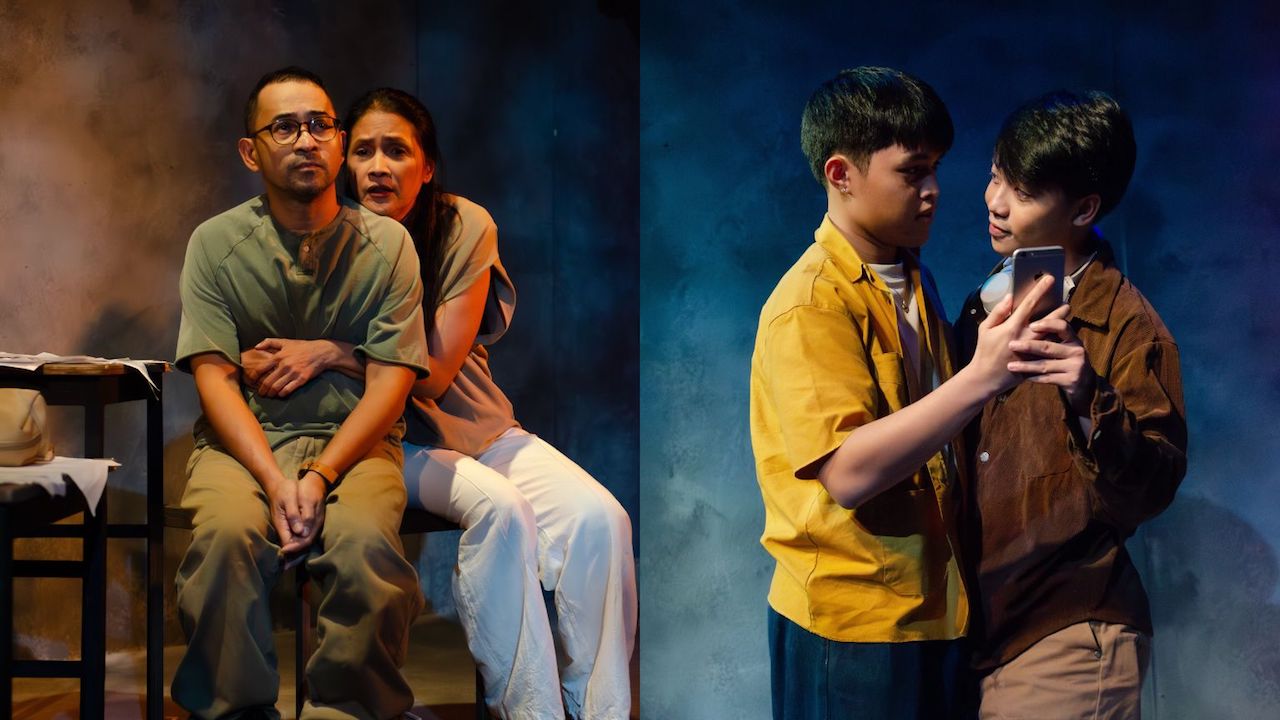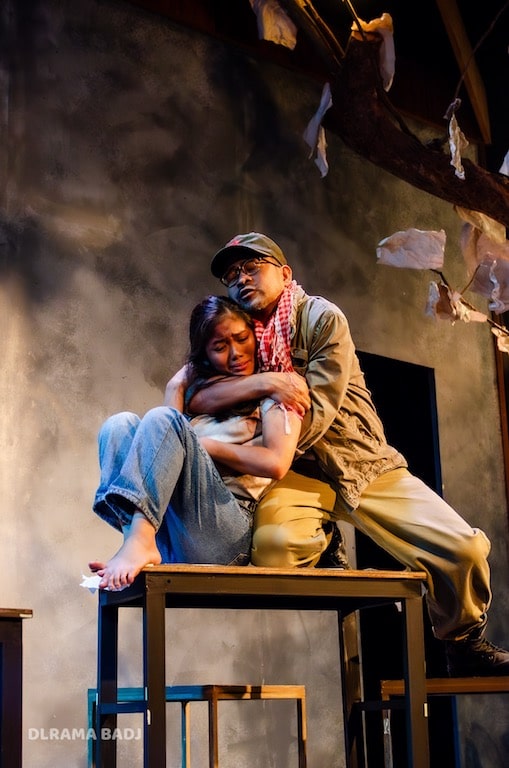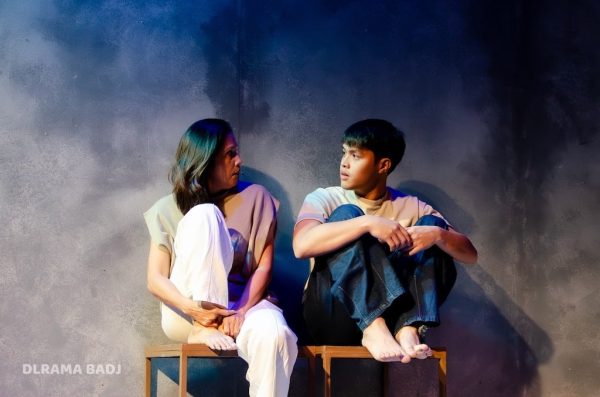
REVIEW: ‘Dagitab’ debates itself into a unique but frustrating experience
“With a uniquely literary style and a cast of compellingly tortured characters, this adaptation of the 2014 Cinemalaya film has difficulty reaching emotional catharsis.”
In its transition from screen to stage, Scene Change’s adaptation of the 2014 Cinemalaya film Dagitab doesn’t just retell the original story written and directed by Giancarlo Abrahan (who is now also a co-producer at Scene Change) but expands on the inner worlds of its characters and the crosses they bear. At its center, college professors Issey and Jimmy struggle to keep their marriage afloat as Issey’s young godson takes a romantic interest in her and as Jimmy is haunted by the woman he once loved, who has been disappeared in the mountains.
Told through dense, literary language, the play rewards active engagement as its tortured characters debate themselves into facing their darkest parts and most taboo thoughts—which the cast handles with great care and confidence. But at a certain point, Dagitab also traps itself in its own labyrinth of ideas, having difficulty fully emerging as something emotionally cathartic.
Overlapping, Obstructing Views
Physically, this labyrinth manifests as D Cortezano’s simple set, with two doors cut into either end of the back wall, several chairs and tables, and a tree—all covered in scrap paper that rustles, crunches, and glides around the stage as the actors step around each other and rearrange the scenery themselves. Director Guelan Luarca-Varela’s decision to have the characters overlap into each other’s scenes and timelines, or even just remain suspended in the background, cut through their philosophizing and to a vulnerability underneath. All their seeming righteousness is stripped away as the others intrude upon and literally walk all over their stories.

Samantha Samarita, Jojit Lorenzo; Photo Credit: DLRAMA BADJ
Watching these performers form parallels and contrasts through how they’re blocked is intriguing, but there are elements here that end up breaking Dagitab’s spell. Anyone sitting behind the first row risks missing key moments between Jimmy (played by Jojit Lorenzo) and the spirit of Lorena (Samantha Samarita), who reunite by the tree in a dreamlike daze. Jethro Nibaten’s lighting—otherwise warm, cold, or textured when need be—makes the choice of abruptly switching tones then fading back in mid-conversation. The effect is distracting, with some scenes feeling like they’re constantly on the verge of ending, tension being released and built up again seemingly at random.
An Incongruous Whole
However, in one way or another, even the production’s more incongruous parts still feel like part of its spirit of invention and endless theorizing, as it keeps looking for new ways to articulate or justify its characters’ neuroses and morally sketchy relationships. Varela-Luarca acts as a scientist running experiments alongside the characters: playing with chronology, directly addressing the audience (who are asked to put on paper hats), utilizing JM Cabling’s movement design to turn intimacy into ritual dance, and making every confrontation an act of literary sparring. In its own restless way, Dagitab seems like it’s in the process of workshopping itself.
Where the show truly makes incongruity work is in its performances, nearly all of which effectively push and pull between eloquent self-assurance and simply crashing out. Agot Isidro’s paranoid Issey tries to command the people around her into order but is ultimately at the mercy of their affection. As a young writer faced with the prospect of his own importance, Elijah Canlas’ Gab slowly but surely transforms from naïve to monstrously selfish. Samarita’s Lorena—while still too short a role to make as much of an impact—brings a soft-spoken calm to the stage that only emphasizes how lost the other characters are.

L-R: Agot Isidro, Elijah Canlas; Photo Credit: DLRAMA BADJ
But it’s Lorenzo who really arrives at an emotional breakthrough, as his Jimmy’s grief—masking itself as academic ambition—finds its way back to the simple truth of his love for his wife. And as the more experienced young writer Angelo, Benedix Ramos steals every scene he’s in. At once self-destructive and irresistibly charismatic, he constantly tests the boundaries of his relationship with Gab, as if both encircling his prey and hoping he himself gets eaten alive.
A Language Trap
All of this is delivered through language that’s deliberately dense and verbose, as each character attempts to transform their pain and confusion into something beautiful—settling for anything less would render all the suffering futile. The results are varied: some repeated phrases become too cute the more they’re used (“chronology is overrated,” “my little yellow putas”), some literary references come off like they’re just signaling knowledge more than they’re being woven into the script. But when the language soars and when turns of phrase build to a steady rhythm, the play’s themes of intellect versus emotion, permissible versus taboo, and honesty versus fabricated honesty can reveal themselves in new, exciting ways.
For this writer, however, Dagitab does overwhelm itself in its second act, where promises of dramatic tension slow to a crawl, its conclusion belabors its point, and the frustrating behavior of its characters can’t be fully redeemed by the catharsis we’re meant to feel by the end. This isn’t to say that the production should simplify itself. If anything, its commitment to its own style can’t help but dilute the story into melodrama. It’s clear where it stands and where it’s meant to end up, but finding the bridge from one end to the other may be more difficult for those who aren’t fully on board with what this show is.
Tickets: P2000
Show Dates: Jul 5–13 2025
Venue: Black Box Theater, Old Communication Building, Ateneo de Manila University, Quezon City
Running Time: approximately 2 hours and 30 minutes (with a 15-minute intermission)
Creatives: Guelan Varela-Luarca (Adaptation, Direction), Giancarlo Abrahan (Story, Dramaturgy), D Cortezano (Set Design), JM Cabling (Movement Design), Jethro Nibaten (Lighting Design), Carlos Hombrebueno (Music)
Cast: Agot Isidro, Jojit Lorenzo, Elijah Canlas, Benedix Ramos, Samantha Samarita
Company: Scene Change


Comments